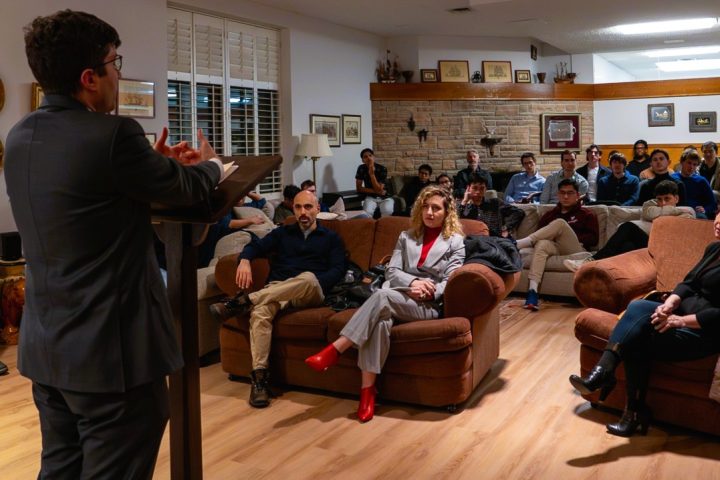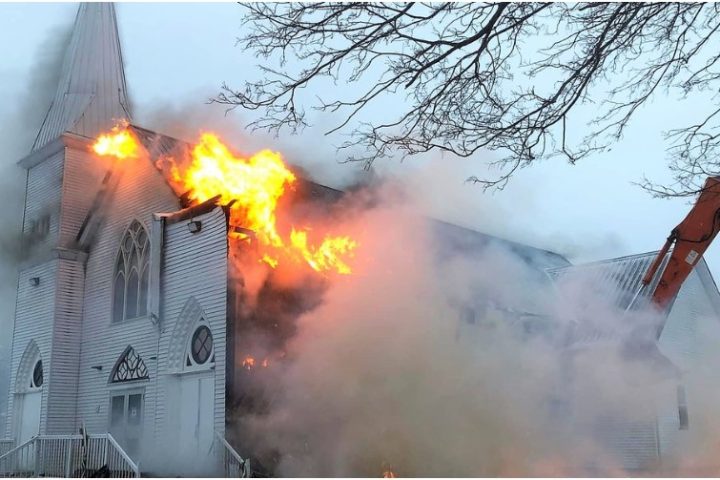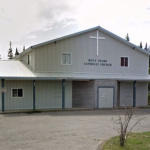The Diocese of Charlottetown has been cleaning out its closet in an effort to sort through some 200 years of history as part of an ongoing archive restoration project.
Debra Majer, archivist for the Diocese of London, returned to Ontario from Prince Edward Island in late June following three weeks of sorting, filing and cataloging centuries’ worth of artifacts and objects from the Charlottetown archives. The undertaking has helped staff rediscover a substantial collection of Catholic and social tokens that tell the story of both the diocese, as well as the province’s past.
“We are looking at over 200 years of history here, diocesan history for sure but also the history of past communities and of all the people that lived here,” Majer said. “Walking into the archive room at the chancery office was overwhelming, but also very exciting.”
The idea for the archive restoration was that of Bishop Joseph Dabrowski. Following his installment in Charlottetown in June 2023, the man with notable admiration for the Church’s long-standing institutional, liturgical and cultural history sought the help of Majer. The two had been acquainted from his years in London as Auxiliary Bishop up to his move to the east coast.
“Being good friends and having worked together, he called me not long after his installment and told me that I needed to come to PEI to do this. He said, ‘I need you to come and help us establish an archive,’ ” Majer said.
What followed a year later was a lengthy road trip to the island where she began working on the project on June 3. Thankfully for Majer, a great deal of care had already been applied to the archive department, notably by Fr. Art O Shea, the diocesan historian and archivist known to collect various artifacts from local parishes. His tagging and notarizing of existing mementos such as scrapbooks, photos and paintings was essential to the initiative’s ongoing success.
Majer’s three weeks out east saw numerous historic heirlooms uncovered and documented, including a piece of the boat used by founding Bishop Angus MacEachern as far back as 1829 and various religious objects such as chalices and monstrances. An old wooden cross from Lennox Island First Nation was also rediscovered.
Perhaps the most intriguing item was a weathered transcript from the year 1694 that contained a survey of the island of the Acadians. It listed three different and distinct Indigenous groups that were present in PEI during that time.
“When I saw that, my heart leapt because it shows us that we (as a Church) are a people’s history, we are a social history and we are part of greater Canadian history too. The origins of the Islands University are through the Church and the origins of the Charlottetown Hospital are through the Church. While this is the history of the Catholic faithful and those who support them, this is also the history of things like health care and education — everything is interwoven,” the archivist said.
Hours worth of appraising, itemizing and organizing parish archives into respective boxes, folders and locations followed. Records of different parishes, church censuses and bishop papers were moved into their new, proper casings. In her last week, Majer was helped by her friend Michelle Pariag, congregational archivist for the Loretto Sisters, with the two even being invited to meet Antoinette Perry, Lieutenant Governor of PEI, who had heard the news of the library organization.
As classifying over two centuries worth of records in three weeks is an impossible task, Majer said Lindsay Winstone, a part-time archivist, will carry on organizing the collection in her place. Now back at home in her role with the Diocese of London, she described how much the opportunity to assist in PEI meant to her.
“It was probably one of the greatest privileges in my career thus far,” Majer said, choking up. “It was amazing, it was something you walk out of going ‘I got to be part of something so wonderful.’ ”
The project is expected to continue right through until the Diocese of Charlottetown’s 200th anniversary in 2029. As the second oldest English diocese in Canada, Fr. Chris Sherren, chancellor of the diocese, hinted that festivities for the impending anniversary will be substantial. He stated that along with a special Mass service, celebrations will likely include a public exhibit to show off some of the history uncovered by the recent archivist project.
Until then, Sherren is excited to continue the project that is illuminating just how historic the Diocese of Charlottetown truly is to its members and beyond.
“It has been amazing to see that so many people over so many years have been contributing to the efforts of the diocese and that those contributions are not lost, they are still contained here in our archives,” Sherren said.






